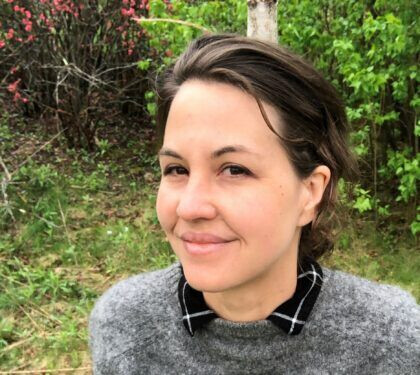American Farmland Trust and Partners Provide Technical Assistance and Education to Advance Climate Smart Agriculture.
Tree tubes protecting newly planted chestnut trees at Adamah Farm.Like the farmers we serve, springtime for many of us at AFT is marked by a sudden and welcome migration from the desk to the field. In early winter we review, crunch numbers, and catch up on paperwork; in late winter we learn and plan and vision– but by springtime it is time to get out to check out how the fields are looking, to test hypotheses, make observations, and hopefully to try something new.
While I may be AFT New England’s newest team member, I am not new to this migration outdoors when spring comes. I’ve followed this rhythm for over ten years—first as an urban farming coordinator in Boston, then as a vegetable farmer in Western Mass, and in more recent years as a soil technical advisor and program director for NOFA/Mass. This is work that I really enjoy, so I am excited to start another season of field work in my new role with AFT.
This month, I had the opportunity to participate in a few collaborative technical assistance/ education projects. Earlier in May I met up with Jono Neiger of Regenerative Design Group and Shamu Sadeh of Adamah Farm in Falls Village, CT. Jono and I were there to collect baseline soil health data and inspect the new chestnut plantings that Shamu and his crew installed on newly adopted farmland. The project is a technical support and education project led by the Connecticut Resource Conservation & Development and Regenerative Design Group. If you’re interested in learning more about chestnut farming in New England, join us for a virtual Field Day at 6pm on July 15. Registration details coming soon to CT RC&D’s Soil Health page.
Over two weekends, I had the opportunity to see some of my former colleagues at two Soil Health Field Days organized by NOFA/Mass as a part of the Massachusetts Coordinated Soil Health Program. The first took place at Long Life Farm in Upton, MA and featured farmers Laura Davis and Donald Sutherland presenting their systems for organic no-till farming. The farmers demonstrated their methods and equipment and shared what they have learned in their process of reducing tillage over the past five years. The event wrapped up with a brief demonstration of some simple and easy field tests for soil health.
The second event was held at Simple Gifts Farm in North Amherst, MA, and featured tractor-scale approaches to reducing tillage, growing cover crops, and increasing soil cover for no-till organic vegetable production. Farmers Jeremy Barker-Plotkin and Dave Tepfer discussed their cover cropping, composting, crop rotation, mulching and equipment strategies for increasing soil cover and building soil organic matter. The event featured demonstrations of some new equipment purchased through a grant from the MDAR Climate Smart Agriculture Program. The new equipment will enable the farm to reduce tillage and bare soil conditions through the use of heavy mulches produced right on farm.
A video recap of both Field Days will be posted on the NOFA/Mass Youtube channel in the next few weeks and links to those resources will also be available on the Massachusetts Coordinated Soil Health Program website.
In June, AFT and UMass Amherst will be hosting and filming a demonstration of a new 2-row no-till transplanter that will soon be available for lending out to area farmers. Find more information on that event, as well as opportunities for New England soil health technical support and education around reduced tillage, cover crops and soil health




